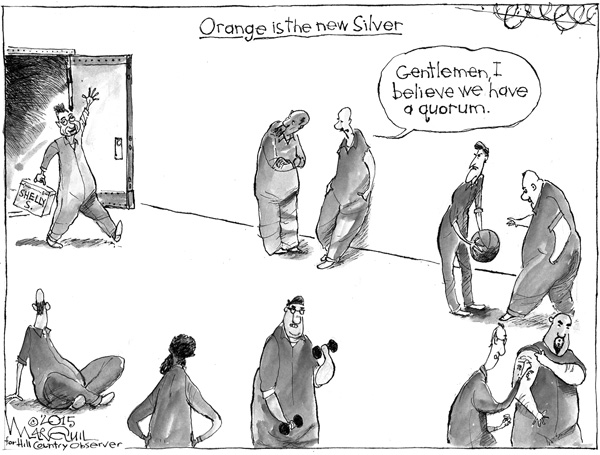Editorial February-March 2015
E D I T O R I A L
A season of reform? Don’t be so sure

It’s tempting to feel a bit gleeful about the spectacular downfall of Sheldon Silver, the New York Assembly speaker whose 20-year reign ended after he was arrested on corruption charges last month.
After all, when you’re dealing with a government as unresponsive and opaque as New York’s, anything that forces a shake-up at the top is bound to raise hopes of change for the better.
In the days immediately after Jan. 22, when federal prosecutors unveiled charges accusing the speaker of taking millions of dollars in bribes and kickbacks, Albany was full of talk about the inevitability of reform.
Yes, the Capitol has had its share of scandals in recent years. The Post-Standard of Syracuse counted more than 40 incidents over the past dozen years in which legislators or other top state officials faced accusations ranging from bribery to extortion to sexual harassment. Efforts to clean up state government flourished, and then fizzled, after many of these incidents.
This time, some say, it will be different. To have one of the three most powerful state officials arrested and accused of rank corruption is just too shocking, even in Albany, to allow business to just go on as usual.
But who will force the Legislature to clean up its act?
With legislative districts gerrymandered to heavily favor one political party or the other, most lawmakers have little real fear of being ousted by the voters – except in the rare case of a primary.
As February dawned, the heavily Democratic Assembly was moving rapidly toward installing Carl Heastie of the Bronx as its new speaker. The choice of Heastie appeared to have been orchestrated not by rank-and-file lawmakers calling for reform, but by Democratic power brokers in New York City who were concerned about keeping someone reliable in the speakership. The speaker, after all, controls a fair number of patronage jobs.
In the state Senate, meanwhile, Republicans are firmly back in control and don’t seem any more interested than the Assembly’s Democratic leadership in shaking up the status quo.
Gov. Andrew Cuomo has lately joined the calls for reform, at one point going so far as to say he might block adoption of a state budget if lawmakers didn’t agree to ethics reforms such as disclosing more details about their outside incomes.
But the governor has a rather sorry history of casting himself as a reformer and then caving in at a critical moment. After his election in 2010, for example, Cuomo championed the idea of a nonpartisan panel to draw legislative districts, saying he’d veto any redistricting plan that wasn’t drawn up by an independent commission. But in 2012, he let the Legislature go forward with its usual round of gerrymandering in exchange for a pension reform bill and some other legislation.
More recently, the governor appointed the so-called Moreland Commission in July 2013 to root out corruption in state government and make recommendations for cleaning up Albany. After Cuomo initially said he wanted the panel to be “totally independent,” his staff repeatedly interfered with its work, and he abruptly disbanded it last March, about nine months ahead of schedule.
Perhaps not coincidentally, one of the Moreland Commission’s areas of inquiry was the outside income of legislators, including the Assembly speaker. Data gathered by the commission ultimately were turned over to the federal prosecutor who brought the case against Silver.

